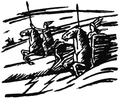Alruna ( Old Norse Ǫlrún, Old High German Ailrun, Modern German Alruna, Alraune) is a Germanic female personal name, from Proto Germanic *aliruna (or possibly *agilruna), which is formed from runa "secret, rune" and a debated prefix that may be ali-, agil-, or alu-.
In German, Alruna was also used as a short form of Adelruna, a different name with a first element *athal- "noble".
In Germanic mythology, Ailrun is the wife of Agilaz, the legendary archer. In the poem Völundarkviða, Ölrun (possibly Old Norse "ale rune" [1]) is identified as a valkyrie, and as a daughter of Kiár of Valland.
Alruna of Cham was an 11th-century Bavarian recluse, the Roman Catholic patroness of pregnancy. It is also the name for the Mandragora or mandrake, a plant belonging to the nightshade family, in a number of Germanic languages: alruna in Swedish, alrune in Danish and Norwegian, and Alraune in German.
See also
Notes
- ^ Simek (2007:251).
References
- Simek, Rudolf (2007) translated by Angela Hall. Dictionary of Northern Mythology. D.S. Brewer. ISBN 0-85991-513-1
Alruna ( Old Norse Ǫlrún, Old High German Ailrun, Modern German Alruna, Alraune) is a Germanic female personal name, from Proto Germanic *aliruna (or possibly *agilruna), which is formed from runa "secret, rune" and a debated prefix that may be ali-, agil-, or alu-.
In German, Alruna was also used as a short form of Adelruna, a different name with a first element *athal- "noble".
In Germanic mythology, Ailrun is the wife of Agilaz, the legendary archer. In the poem Völundarkviða, Ölrun (possibly Old Norse "ale rune" [1]) is identified as a valkyrie, and as a daughter of Kiár of Valland.
Alruna of Cham was an 11th-century Bavarian recluse, the Roman Catholic patroness of pregnancy. It is also the name for the Mandragora or mandrake, a plant belonging to the nightshade family, in a number of Germanic languages: alruna in Swedish, alrune in Danish and Norwegian, and Alraune in German.
See also
Notes
- ^ Simek (2007:251).
References
- Simek, Rudolf (2007) translated by Angela Hall. Dictionary of Northern Mythology. D.S. Brewer. ISBN 0-85991-513-1
